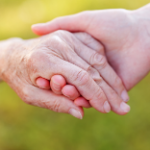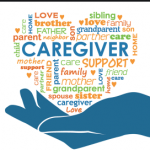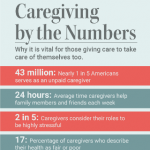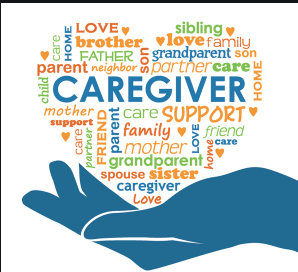Welcome back! Last week, we talked about Vitamin D and how it may help people who live with Fibromyalgia or Psoriasis. If you missed that blog and would like to catch up, click HERE.
This week, we are going to talk about the caregiver. This week’s blog comes with a trigger warning: suicide.

Having worked professionally in the field of caregiving my entire career, being a single mom, followed by giving care to my two parents until they passed away, I could probably have written this blog without doing any research. I chose not to.
The experience of caregiving goes way beyond my little world. There are people who give care to their differently-abled children, something I’ve never done. There are people who give care to farm animals, which is a 24/7 job, or are working in an animal rescue or shelter, also something I’ve never done. Caregiving is a very large topic, but the one thing all caregivers have in common is burnout. The other thing many of them have in common is health concerns. If you are a caregiver, you are nodding your head and thinking, “Yep” right now.

Did you know that Veterinarians have a higher rate of death by suicide than the general population? It’s true. In an article in Time Magazine, Dr. Will McCauley talks about his experience with burnout. The 33-year-old veterinarian was wracked with student debt and worn down by the daily demands at work, which included euthanizing dogs and cats and being vilified by pet owners for not meeting their expectations. “I was tired in this miserable state of mind,” he says. “It just drained me so much.” For reasons he attributes to either fear or hope, McCauley didn’t kill himself that summer day in 2016, and he quit his job later that week and stopped practicing. “I knew I had to make a change,” McCauley says. “I was dead on the inside.”
Rescue work is very taxing as well. Those who dedicate themselves to saving animals experience a wide range of emotions on any given day. Seeing an animal find a loving forever home can bring elation one moment; seeing an abused, lost and frightened animal in a shelter or disaster zone can bring heartbreak the next.
Best Friends points out that “Saving and caring for animals doesn’t stop when the clock strikes five. And that’s one reason animal welfare work can be so emotionally exhausting, making caregivers and rescuers more prone to burnout“.
“Loving animals is 24 hours a day, seven days a week. It’s always foremost in the animal lover and rescuer’s mind,” says Linda Harper, a clinical psychologist in private practice in the Chicago area and author of two books, including “Give to Your Heart’s Content Without Giving Yourself Away.“

Book Review: “Believing that saying yes to all requests-be it for time or money-is doing the right thing, they deny their own needs and end up feeling depleted. Give to Your Heart’s Content is not about giving more; it is about giving from the deepest self, in a way that nurtures rather than depletes. Offering practical, user-friendly self-inventories, Dr. Harper helps readers evaluate if their style of giving might be adding stress to their lives. This is a much-needed book for caregivers, people in the helping professions, volunteer organizations, and people in institutional settings, like churches and nonprofit organizations, which emphasize giving. Give to Your Heart’s Content is a book for all who struggle with life’s continual demands on time, money, and energy“.
A Groundbreaking Documentary on Family Caregiving aired on OPB on October 11, 2000. The Northwest Osteopathic Medical Foundation put this program together because even in the year 2000 they saw a need to talk about our aging population, and the people who will care for them. During this documentary, it was claimed that the average caregiver works “an additional 18 hours, on top of what they already shoulder”. They offer a quiz on their page that gives the caregiver some insight into their stress levels. Click HERE to take the quiz. The quiz is at the bottom of the page.
The honor of caring for a loved one at home is often offset by the stress that comes with being responsible for the care of another human being who is not only very fragile but dear to your heart. While medical professionals absolutely experience burnout, people who give care to their loved ones have special needs. They don’t get to go home at the end of the day. They are already home.
There are no breaks, no vacations, and no backup. Oddly enough, when one offers to care for a parent or grandparent, the rest of the family often washes their hands of the situation, feeling that they “can’t do it as well as you can” or “I’m just too busy with work and home“. While both these things may be true, it doesn’t help the caregiver.
The caregiver starts to feel isolated, unseen and develops a resentment that they then feel guilty for having. “I loved my mom“, Betty said, “and I strongly resented my family at the same time. It certainly never changed the level of love and care I gave to her, but I really resented my brother and his wife for never even offering to bring a meal. Instead of going off on them, I internalized my anger. It was all on me and I became very depressed“. Betty is not alone.

Aging Care wrote an article about this very emotion, resentment. “Most caregivers have some idea of how they intended to spend their lives. But thanks to medical advancements, aging parents are living longer than ever despite serious health conditions, such as dementia, Parkinson’s disease, chronic obstructive pulmonary disease (COPD), and heart failure. Their care falls to loved ones whose plans and expectations are upended. Resentment isn’t a pretty emotion, but it is nigh impossible to avoid as a caregiver. Furthermore, admitting those feelings to others will not likely bring pats on the back“.
That last sentence is so true and one reason so many caregivers fall into poor health. It’s not even ok to talk about how one feels about their situation, much less ask for respite. The judgement of others often keeps the caregiver from reaching out…from admitting that they are on the edge, ready to jump.
Many times, caregivers are women. Obviously, some in-home caregivers are men, but the job overwhelmingly falls to women to take care of grandma.
The Office on Women’s Health writes that “Stress from caregiving is common. Women especially are at risk for the harmful health effects of caregiver stress. These health problems may include depression or anxiety”.
“Some stress can be good for you, as it helps you cope and respond to a change or challenge. But long-term stress of any kind, including caregiver stress, can lead to serious health problems.

Some of the ways stress affects caregivers include:
- Depression and anxiety. Women who are caregivers are more likely than men to develop symptoms of anxiety and depression. Anxiety and depression also raise your risk for other health problems, such as heart disease and stroke.
- Weak immune system. Stressed caregivers may have weaker immune systems than non-caregivers and spend more days sick with the cold or flu. A weak immune system can also make vaccines such as flu shots less effective. Also, it may take longer to recover from surgery.
- Obesity. Stress causes weight gain in more women than men. Obesity raises your risk for other health problems, including heart disease, stroke, and diabetes.
- Higher risk for chronic diseases. High levels of stress, especially when combined with depression, can raise your risk for health problems, such as heart disease, cancer, diabetes, or arthritis.
- Problems with short-term memory or paying attention. Caregivers of spouses with Alzheimer’s disease are at higher risk for problems with short-term memory and focus.
So what can caregivers do to relieve some of the stress that goes along with their jobs? The first and foremost suggested task is to find a therapist you feel comfortable with. Tell them everything you are experiencing and feeling, and give them an opportunity to find you some resources. If this pandemic has given us anything, it’s the realization that much of our healthcare can be done via telephone or by computer meetings. If you can’t leave your loved one, you can at least have a phone conversation with a professional.
Give someone a call. It can’t hurt and it may very well help you tremendously. Pick up the phone today…you are not alone. Talking to friends and spouses may frustrate you even further because they won’t get it. They get to leave their job and go home. You don’t. The comparison is apples to oranges.
Also, don’t hesitate to look at other options for your loved ones, such as assisted living. You aren’t a superperson and you can’t do it all. I know that’s the expectation but it’s not realistic. Look over all of your options.
Lastly, love yourself. You are amazing. Whether you care for animals, children, or adults, you are a kind, loving, giving, caring, sharing human being, and the world is better off with you in it. Stay. Please.
Editors note: This blog is not a replacement for sound medical advice, and many diseases, disorders, and syndromes have symptoms that overlap. Only a qualified medical professional can diagnose you. That said, if you think this blog may be helpful to others, please hit the Facebook Icon and share it on your personal pages. Thank you for reading us, we really do appreciate you!

1 Comment